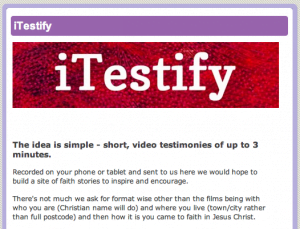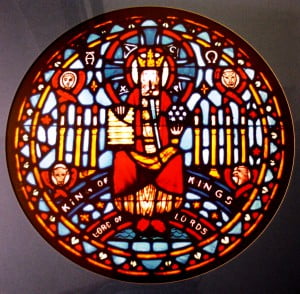The importance of testimony
I was really delighted to see the new Church of England projection iTestify launched this summer. (I was likewise a tad disappointed, since I was thinking of doing something similar myself!).
The thought is uncomplicated – short, video testimonies of upwardly to 3 minutes.
Recorded on your phone or tablet and sent to us here we would hope to build a site of faith stories to inspire and encourage.
At that place's not much nosotros ask for format wise other than the films beingness with who you are (Christian name will practice) and where you live (town/urban center rather than full postcode) and so how it is you came to organized religion in Jesus Christ.
 This looks like a potentially pregnant mission resource in our postmodern context. For i thing, people honey stories, and are much more open to hear stories of other people than any more formal explanation of conventionalities. Secondly, it highlights the importance of personal feel, which in some parts of our civilisation appears to be the unquestionable authority. Thirdly, telling our story side-steps (for the moment) getting into debates about truth claims, and provokes interest in religion by another route. (The debate most truth claims still needs to be had; there is adept bear witness that xviii–35s are still interested in the apologetic questions well-nigh Jesus and his didactics.)
This looks like a potentially pregnant mission resource in our postmodern context. For i thing, people honey stories, and are much more open to hear stories of other people than any more formal explanation of conventionalities. Secondly, it highlights the importance of personal feel, which in some parts of our civilisation appears to be the unquestionable authority. Thirdly, telling our story side-steps (for the moment) getting into debates about truth claims, and provokes interest in religion by another route. (The debate most truth claims still needs to be had; there is adept bear witness that xviii–35s are still interested in the apologetic questions well-nigh Jesus and his didactics.)
Of course, at one level none of this is new. The practiced news about Jesus first spread to non-Jews by those driven from the Jerusalem persecution 'gossiping' their feel to their neighbours (Acts 11.20). Merely testimony is assuming fifty-fifty more importance in the move from modernity to mail-modernity, where 'authority figures' (like Billy Graham for a previous generation) take less credibility. Instead, people increasingly make decisions on the basis of 'social proof'—something must exist true if all my friends believe it—which is probably the sole reason why Facebook makes whatsoever money at all! Companies take long realised that it is highly constructive to go individuals to evidence to their friends about a production as part of their promotion.
Across this, testimony also has substantial theological significance. In his outstandingModels for Scripture, John Goldingay proposes 4 means in which Scripture presents itself: as witnessing tradition; as administrative canon; as inspired word; and equally experienced revelation. He presents these iv pairs equally an approach that gets round the narrowness of claiming Scripture is 'authoritative'simpliciter, since this is a category which suits commandments—and at that place is a lot else in the Bible!
In exploring testimony, Goldingay notes a number of important issues. Start, it is clear that someone's testimony is simply that—the testimony of that person. Information technology will always have a personal perspective, and presents the events it relates as interpreted from that person'south perspective—interpretation is ever an essential element of the testimony. Secondly, and in some tension with this, testimony makes an explicit claim to factuality. Yeah, this is my interpretation of reality—but information technology is an interpretation ofreality, and in that regard it invites further exploration and scrutiny. Testimony points beyond itself to that to which it testifies.
All 4 model-pairs tin be applied to the whole of Scripture, but each also finds item expression in certain parts. The theme of witnessing and testimony is particularly prominent in the Johannine material—the gospel co-ordinate to John, the letters of John, and the volume of Revelation. This can been seen hands in the occurrence of words with themartyr-stem (to evidence, witness, and so on): at that place are 67 occurrences in the gospels, of which 47 are in John; nearly a 3rd of the 57 occurrences in the epistles come up in the messages of John; and there are a farther 19 occurrences in Revelation.
(Nosotros demand to overcome our problem in English, thattestimony comes from the Latintestus butwitness comes from a German route. We often miss the importance of testimony/witnessing, which are all from the aforementioned route in NT Greek.)
Testimony plays a key part in John's gospel from the commencement. John the Baptist arrives on the scene in chapter one primarily as a witness more than a baptiser—his baptism of Jesus is assumed rather than stated (peradventure John expected y'all to accept already read Mark's gospel…?). John's testimony is divided into two parts, the first in John 1.15, and the second in John 1.xix–27, and this idea of 'double testimony', derived from the test of true witness in Deut 17.vi, is returned to in John five.31 and post-obit. Jesus' testimony is not valid if it stands lonely; only in fact 'in that location is some other [the Father] who testifies in my favour'. The notion of testimony 'in my favour' (as the TNIV puts it) indicates something important about its utilise in John; testimony is crucial when the truth is contested, and as Andrew Lincoln argued inTruth on Trial, this is especially so in the context of a court trial scene, and idea constantly in the groundwork throughout the gospel.
Thus, in the wonderful narrative of the healing of the homo born blind in John ix, the witnesses in the drama are brought on one by 1, and advisedly cross-examined, before a verdict is reached. The heart-bespeak of the drama is the appearance of the man'south parents, who duck the question and refer the Pharisees back to the man himself. His appearances bracket this on either side, and he is bedevilled on his 2d appearance on the grounds but of his testimony: 'One thing I know. I was blind, but at present I see!' (John 9.25).
 Testimony also finds its place in the context of disharmonize in the Book of Revelation. The whole book is shaped by the theme of cosmic conflict, and thedramatise personae appear to be lined upwards on two sides which continuously clash with one another. Into this steps the figure of Jesus, who (uniquely in the New Attestation) is described as the 'true-blue witness' (Rev 1.five, 3.fourteen). Expressing its theology by means of its structure, Revelation includes the phrase 'testimony to Jesus' seven times, and, confronting using the notion of two-fold testimony, includes the name 'Jesus' xiv times (= ii ten seven). 'The saints' also occurs 14 times, since their calling is to be faithful witnesses just as Jesus was. They attain victory non but by 'the blood of the lamb' but likewise by 'the word of their testimony' (Rev 12.11). In fact, the 'testimony of Jesus' (about Jesus? by Jesus?) is given a central theological importance in relation to who God is, the nature of the gospel and the work of the Spirit in what appears to be a programmatic assertion that 'the testimony of Jesus is the Spirit of prophecy' (Rev xix.6).
Testimony also finds its place in the context of disharmonize in the Book of Revelation. The whole book is shaped by the theme of cosmic conflict, and thedramatise personae appear to be lined upwards on two sides which continuously clash with one another. Into this steps the figure of Jesus, who (uniquely in the New Attestation) is described as the 'true-blue witness' (Rev 1.five, 3.fourteen). Expressing its theology by means of its structure, Revelation includes the phrase 'testimony to Jesus' seven times, and, confronting using the notion of two-fold testimony, includes the name 'Jesus' xiv times (= ii ten seven). 'The saints' also occurs 14 times, since their calling is to be faithful witnesses just as Jesus was. They attain victory non but by 'the blood of the lamb' but likewise by 'the word of their testimony' (Rev 12.11). In fact, the 'testimony of Jesus' (about Jesus? by Jesus?) is given a central theological importance in relation to who God is, the nature of the gospel and the work of the Spirit in what appears to be a programmatic assertion that 'the testimony of Jesus is the Spirit of prophecy' (Rev xix.6).
If testimony has theological and scriptural significance, it is too of applied importance. Arun Arora, Director of Communications for the Church, explains the aims of the iTestify projection:
We hope to launch this as a website with faith stories uploaded early in 2015.
- iTestify seeks to encourage Christians across the country to tell their story of organized religion in a three minute motion-picture show.
- From ancient times Testimony has served 2 purposes: enabling the individual to recount the story of God's faithfulness in their lives (up). Inviting others through story to hear of God'southward action in the our ain lives (out). Encouraging people inside the torso of the Church of the continuing work of the Spirit (in).
- Traditionally testimony has been delivered every bit part of services especially prior to baptisms in the Anglican tradition and more widely in the gratis church building tradition every bit part of attesting to the work of God.
- This would be a website based campaign where individuals tin upload their own stories of faith of upwardly to three minutes recorded on phone or tablet to a central website.
- The site would and so become an on-going resource for individuals, churches and others both as an encouragement and also as a identify where stories of religion can be played, shared on social media and utilised for services.
- It's open to any individual with a smartphone and a testimony.
As he notes, the sharing of testimony part as office of worship and builds upward the faith of the community as well every bit functioning equally invitation to others to notice more for themselves. Terminal Sunday, I interviewed Kim and asked her to share her story, which I mentioned in my exploration of beingness lost and found. I wonder if we all ought to be sharing testimony as a thing of grade when we gather for worship.
If y'all have valued this postal service, would you considerdonating £ane.20 a month to support my work?
If you enjoyed this, do share it on social media (Facebook or Twitter) using the buttons on the left. Follow me on Twitter @psephizo. Like my page on Facebook.
Much of my work is done on a freelance basis. If yous have valued this post, you tin make a single or repeat donation through PayPal:
Comments policy: Proficient comments that engage with the content of the mail service, and share in respectful debate, can add together real value. Seek first to sympathise, then to be understood. Make the most charitable construal of the views of others and seek to learn from their perspectives. Don't view debate as a disharmonize to win; address the argument rather than tackling the person.
Source: https://www.psephizo.com/biblical-studies/the-importance-of-testimony/
0 Response to "The importance of testimony"
Post a Comment